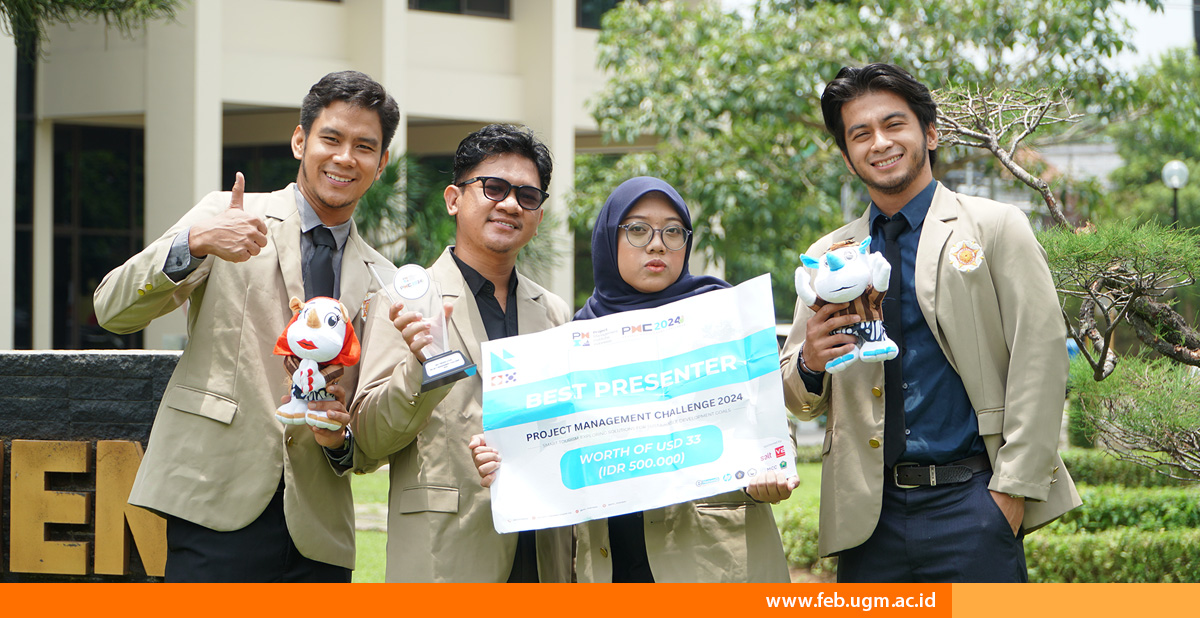MM FEB UGM Students Propose Innovation for Visitor Flow Management at Gembira Loka Zoo
- Details
- Written by Orien
- Category: Achievement
- Hits: 210

A group of students from the Master of Management program at the Faculty of Economics and Business, Universitas Gadjah Mada (MM FEB UGM), have developed an innovative solution to manage the flow of visitors at Gembira Loka Zoo (GLZoo). Their project, entitled "Sustainable Smart Crowd Control: A Data-Driven Visitor Flow Management," aims to reduce congestion at popular attractions within the zoo, especially during weekends and holidays.
The innovation was designed by the Kaizen Krew team, which consists of Deni Bagas Pradana (MBA 83 - Marketing), Fajar Munichputranto (IMBA 83), Achmad Iqbal Ashrye (MBA 81 - Operations Management), and Anteng Laras Palupi (MBA 81 - Operations Management). They developed this concept under the guidance of Rocky Adiguna, SE., M.Sc., Ph.D., and won the Best Presenter Award at the Project Management Challenge 2024 held on September 28-29, 2024 at Universitas Brawijaya, Malang.
Fajar Munichputranto explained that their innovation to reduce visitor congestion uses RFID technology embedded in wristbands as admission tickets. Sensors at the entrance to each attraction detect the RFID wristbands, allowing real-time monitoring of the number of people waiting in line. "This system displays queue lengths on screens located at strategic points throughout the zoo," he recently explained.
By providing visitors with real-time queue information, the system helps them make better decisions, such as exploring other areas while waiting for lines to clear. This data-driven approach is expected to improve visitor comfort, reduce congestion, and promote a more sustainable flow throughout the zoo.
The Story Behind the Award
The team went through a long journey to win the title, competing against 47 teams from four countries. At the beginning of the competition, all teams were asked to submit an abstract on the topic "Smart Tourism: Exploring Solutions for Sustainable Development Goals. After passing the abstract selection, the team submitted a mini-project master plan proposal on the same theme.
"After passing the abstract selection, we created a mini-project master plan with the theme *Smart Tourism: Exploring Solutions for Sustainable Development Goals*, using Gembira Loka Zoo as a case study," Fajar explained.
After passing the initial selection, they participated in the final round of the competition, which was held in person in Malang. The final round consisted of three main events over three days: presentation of the mini-project master plan, participation in a cultural night, visit to a sudden case site, and presentation of an updated mini-project master plan based on the case site visit.
For the grand final, the team visited Kampung Warna Warni in Malang, where participants were asked to create a new mini-project master plan. Fajar and his team proposed a Smart Water Defense project: Integrating Eco Trash Barriers for Sustainable Waste Containment. They proposed a trash trap in the river equipped with sensors and an automatic removal system to prevent flooding in the area.
Reportage: Orie Priscylla Mapeda Lumalan
Editor: Kurnia Ekaptiningrum
Sustainable Development Goals







